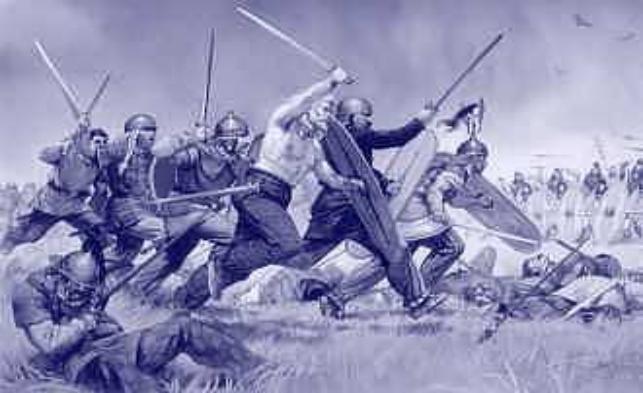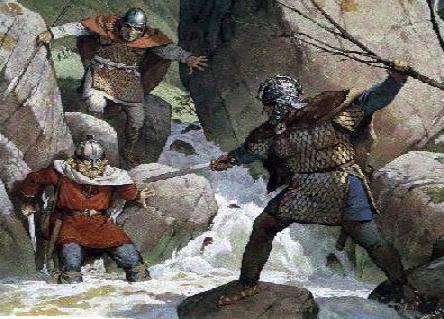

| MENU |

| Wallasey Village 1895 |

Whats in a name ?
Smoke Rose above the trees as another homestead went up in flames. Woman screamed as they
fled, grabbing their children, to escape the sword of the invader. On and on came King Aethelfriths
soldiers, as they advanced northwards through Wirral. Having conquered Chester, they found the
Celtic tribe called the Carnavil rather easy to overcome. And so the remaining Celts or Britons
retreated, some surrendered others were killed. The invading army of the Angles of Northumbria
had attacked in 613A.D.
The Anglo Saxons were better equipped for warfare, especially against simple peasant folk. They
smashed down churches and set fire to farm buildings and houses.
Smoke Rose above the trees as another homestead went up in flames. Woman screamed as they
fled, grabbing their children, to escape the sword of the invader. On and on came King Aethelfriths
soldiers, as they advanced northwards through Wirral. Having conquered Chester, they found the
Celtic tribe called the Carnavil rather easy to overcome. And so the remaining Celts or Britons
retreated, some surrendered others were killed. The invading army of the Angles of Northumbria
had attacked in 613A.D.
The Anglo Saxons were better equipped for warfare, especially against simple peasant folk. They
smashed down churches and set fire to farm buildings and houses.
| The Saxons continued across the peninsula only to find that the Britons were to make their final stand, having crossed over the marsh to the other side; to join the small number of inhabitants on this hill at the North end of the peninsula. They took cover in sandstone rocks, others crouched behind the gorse bushes that grew in abundance, unable to retreat any further they appeared ready to fight to the last. |



Now the tide had come in and they awaited the advancing enemy armed with bows, arrows and
spears. The little hill was surrounded by water on three sides, Northwards by the Irish sea, East by
the river Mersey, and South by the Wallasey Pool. Marshland made up the remaining area, thus
forming almost an island. The Saxon soldiers made a half hearted attempt to cross the water, and
not having any boats to hand, found it somewhat difficult, not to mention the occasional arrow or
two falling near by.
As water had stopped the advancing German Troops at the English Channel in World War Two, so
to did the same thing happened here.
spears. The little hill was surrounded by water on three sides, Northwards by the Irish sea, East by
the river Mersey, and South by the Wallasey Pool. Marshland made up the remaining area, thus
forming almost an island. The Saxon soldiers made a half hearted attempt to cross the water, and
not having any boats to hand, found it somewhat difficult, not to mention the occasional arrow or
two falling near by.
As water had stopped the advancing German Troops at the English Channel in World War Two, so
to did the same thing happened here.
Having succeeded in
taking almost the whole of
Wirral, the Saxons decided
it was not worth the
trouble to capture the
small band of Britons who
were holding their own on
the gorse covered
sandstone island. And so
they let them stay there,
thus calling it "Wealasieg"
meaning "Welshmans
Island". At this time the
Saxons had already given
the Celts or Britons the
name of "Wealas"meaning
"strangers" which is
where the name "Welsh"
derives from.
taking almost the whole of
Wirral, the Saxons decided
it was not worth the
trouble to capture the
small band of Britons who
were holding their own on
the gorse covered
sandstone island. And so
they let them stay there,
thus calling it "Wealasieg"
meaning "Welshmans
Island". At this time the
Saxons had already given
the Celts or Britons the
name of "Wealas"meaning
"strangers" which is
where the name "Welsh"
derives from.
With the coming of the Danes or Norseman to these parts they always called a settlement with a
church, a church town, so they gave the place the name of "Kirby in Walea" meaning "Church town
in Wallasey" and the other church town on the opposite corner of the peninsula they christened
West Kirby (West church town). The name Walayesegh is first recorded in the 13th century but the
registers at Lichfield refer to it as "Kirkby in Wallea" or "Kirkby Waley". Thereafter the town is
known as Walasey or Wallazey, until finally we have what we known samply today as Wallasey.
- Taken from Almost an Island by Noel E SMith
church, a church town, so they gave the place the name of "Kirby in Walea" meaning "Church town
in Wallasey" and the other church town on the opposite corner of the peninsula they christened
West Kirby (West church town). The name Walayesegh is first recorded in the 13th century but the
registers at Lichfield refer to it as "Kirkby in Wallea" or "Kirkby Waley". Thereafter the town is
known as Walasey or Wallazey, until finally we have what we known samply today as Wallasey.
- Taken from Almost an Island by Noel E SMith

